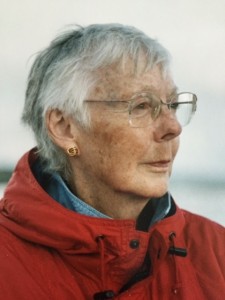Constance “Connie” Noblet, 91, a pioneer in the crime victims’ rights movement, died on Sunday, Dec. 6, in Rhode Island, where she had lived for more than 20 years; however, her influence and inspiration never left Pennsylvania, those who worked with her said.

In 1973, Noblet co-founded and served as director of the Rape Crisis Council of Chester County, one of the first rape crisis centers in the country. Such agencies brought to the victims’ movement a recognition of the emotional damage inflicted by violent crimes and the importance of helping victims rebuild their lives within a criminal justice system that often mistreated them.
“Through our work with rape victims, we have recognized and helped other severely traumatized victims of violent personal crimes,” Noblet said in 1977 as the agency’s services had begun broadening to include victims of assault, robbery, stalking, drunk driving, attempted homicide, as well as the families of homicide victims.
In addition to providing direct services, the center, which has received national as well as international accolades, has worked with police, hospital staff, lawyers and social agencies not only to help victims but also to educate others about their needs. Groups from Japan, New Zealand and Russia have traveled to West Chester to copy the center’s programs.
The agency’s name ultimately changed to the Crime Victims' Center of Chester County, Inc. to reflect its wider mission, and when Noblet relocated to New England in 1988, her presence continued to be felt, said Peggy Gusz, a co-founder of the Rape Crisis Council who succeeded Noblet as CVC’s director.
“We wouldn’t be where we are today without her,” Gusz said.
Chester County Chief Deputy Sheriff George P. March said he met Noblet when he was first assigned as a state trooper to the Downingtown barracks. He described her as passionate and persuasive in her mission to serve victims. He recalled accompanying victims to meet Noblet and other advocates, establishing ties that ultimately benefitted everyone.
March said rape investigations in particular required intimate details to prosecute. “You can imagine how uncomfortable that would be for a victim,” March said, adding that the victims’ advocates provided important emotional support. On many occasions, March remembered being thanked by both the victim and the victim’s advocate for bringing them together.
“Connie was the kind of person that once you met her, you never forgot her, and you always admired what she was able to accomplish,” March said.
Mike Cotter, a retired lieutenant with the Chester County Detectives, said Noblet played a pivotal role in improving victims’ rights throughout Chester County. Her influence pervaded numerous decisions, ranging from establishing a team of county detectives to handle abuse cases to creating a Children’s Advocacy Center, a child-friendly facility for interviewing young victims and their families.
Cotter said before Noblet and her crew helped revamp the system, victims were simply part of a criminal investigation, and they would receive a phone call or subpoena telling them to show up in court. Most of the victims were scared and some had been so traumatized that they could barely remember what happened, Cotter said.
“Connie and her team – a group of upstanding, outspoken, intelligent people – were able to help guide victims through the process,” he said. “Connie was the one who got the ball rolling, and then Peggy kept it rolling.”
Born Constance Catherine Knickerbocker in Providence, R.I., Noblet grew up in Cranston and attended Rhode Island Hospital's school of nursing, graduating as a registered nurse. In 1947 she married Earl Noblet of Fairhaven, Mass., a World War II veteran then studying chemistry at Brown University.
The couple moved to Stamford, Ct., where Mrs. Noblet worked at St. Joseph’s Hospital and then at Courtland Gardens Nursing and Rehabilitation Center. After a 25-year career in psychiatric, general and geriatric nursing, she began her major life’s work at the age of 48. The family had moved from Connecticut to East Whiteland, where, after working in community theater, Noblet joined a volunteer effort to provide counseling and support to rape victims in nearby West Chester.
Her work took her to crime scenes, accident sites, train wrecks, plane crashes and even a Bosnian war zone, where she helped guide efforts to comfort trauma victims. She also gave numerous workshops and seminars, sharing her skills and expertise with new victim service providers and criminal justice professionals. She trained hundreds of police officers and civil authorities to treat victims of rape and other violent crimes with dignity, and to assist crime witnesses.
“She touched so many people,” Gusz said, calling Noblet “the best role model and mentor a person could have – especially in this field.”
From 1983 to 1985, Noblet served as president of the board of directors of the National Organization for Victim Assistance (NOVA). She advised communities developing sexual assault or comprehensive crime victims’ centers, and volunteered her time to the National Organization for Victim Assistance and the National Institute of Mental Health as a conference planner and facilitator, and continued to serve on crisis-response teams through 1993.
She also lobbied in Washington, D.C., for a new federal policy toward victims, and in 1987 was congratulated for her efforts by then President Ronald W. Reagan after being honored by the Department of Justice for “outstanding contributions in assisting victims of crime.” She received the first Woman of the Year Award from the Women's Coalition of Pennsylvania.
Noblet continued her work her after she and her husband returned to Rhode Island, settling in Narragansett. Even in her 70s, she helped train police and officials in crafting disaster response plans and as a member of Rhode Island’s Crime Prevention Planning Committee (CPPC). In 2003 she received the Neil J. Houston, Jr. Memorial Award presented by Justice Assistance of Rhode Island, for service contributing toward improving the state’s criminal justice system.
During that time, Gusz said she kept in touch with Noblet and often thought of her during the most challenging situations. “In moments of panic, all I had to do was stop – take a deep breath – and say to myself: What would Connie do? Miraculously, it turned out to be the right thing and that is how CVC got to be where we are today.”
Noblet’s professional and volunteer career spanned over five decades, during which she aided, counseled, intervened and advocated on behalf of victims of crime, accidents, violence, war and other disasters, working past the age of 80.
She is survived by five sons, Christopher of Jamestown, R.I., and Schull, Ireland; Jonathan of Narragansett, R.I.; Kevin of Port Chester, N.Y., and Barkhamsted, Conn.; Dennis of Raleigh, N.C.; Matthew of Langhorne, Pa., five daughters-in-law: Kathleen, Karen, Joan, Helen and Tamre, and 10 grandchildren: Kristin, Nathaniel, Martha, Erin, Emily, Devin, Andrew, Ryan, Shannon and Virginia.
At Noblet’s request, the family said no services are planned. Gusz said she intends to make a donation in Noblet’s name to the Crime Victims' Center of Chester County.



Comments